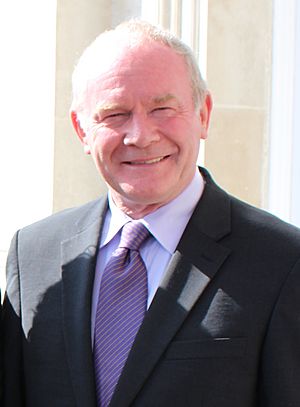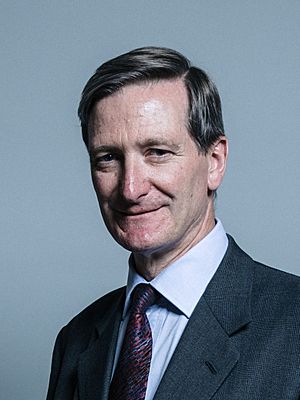Northern Ireland (Executive Formation etc) Act 2019 facts for kids
| Act of Parliament | |

|
|
| Long title | An Act to extend the period for forming an Executive under section 1(1) of the Northern Ireland (Executive Formation and Exercise of Functions) Act 2018 and to impose a duty on the Secretary of State to report on progress towards the formation of an Executive in Northern Ireland and other matters; to impose duties to make regulations changing the law of Northern Ireland on certain matters, subject to the formation of an Executive; and for connected purposes. |
|---|---|
| Citation | 2019 c.22 |
| Introduced by | Karen Bradley (Commons) Lord Duncan of Springbank (Lords) |
| Territorial extent | United Kingdom |
| Dates | |
| Royal assent | 24 July 2019 |
| Commencement | Between 22 October 2019 and 31 March 2020 |
| Other legislation | |
| Amends |
|
| Relates to |
|
|
Status: Current legislation
|
|
| History of passage through Parliament | |
| Text of statute as originally enacted | |
| Revised text of statute as amended | |
The Northern Ireland (Executive Formation etc) Act 2019 is a law passed by the Parliament of the United Kingdom. This law helped extend the time for Northern Ireland to form its own government, called the Northern Ireland Executive. It gave them until January 13, 2020, to get a government working again.
The Act also gave more powers to the Secretary of State for Northern Ireland during this time. It made sure the Secretary of State had to report to Parliament regularly. This was also a way to limit the power of the government to stop Parliament from meeting. A very important part of this law was making marriage for all couples and civil partnerships legal in Northern Ireland. This brought Northern Ireland's laws in line with the rest of the United Kingdom.
Contents
Why This Law Was Needed
No Government in Northern Ireland

Northern Ireland's government, called the Executive, stopped working in 2017. This led to new elections. For the first time, parties that wanted to stay part of the UK did not win a majority of seats. This happened because of a scandal, the role of the DUP in Brexit, and changes in the population.
When a government isn't formed, the law says new elections must happen within six weeks. To avoid constant elections, the UK Parliament passed other laws in 2017 and 2018. These laws gave more time for Northern Ireland to form a government. The 2019 Act was introduced to give even more time. Eventually, in January 2020, a new government was formed under a plan called the New Decade, New Approach agreement.
Brexit and Parliament Meetings
In 2019, some politicians were worried that the new Prime Minister might stop Parliament from meeting. This is called "proroguing parliament." They were concerned this could be done to force through a no-deal Brexit.
Because the Northern Ireland Act was being discussed at this time, some Members of Parliament (MPs) saw a chance to add rules to it. These rules would make it harder to stop Parliament from meeting. The slow progress of forming a government in Northern Ireland and the impact of Brexit on the Irish border were reasons to add these new rules.
Equal Rights in Northern Ireland
For a long time, Northern Ireland had different laws regarding the rights of LGBT people compared to the rest of the UK. This was partly because a special voting rule allowed some parties to block changes. As a result, marriage for all couples was not allowed or recognized by the government in Northern Ireland.
Since Northern Ireland's own government wasn't working, the UK Parliament stepped in. They used "direct rule" to make laws for Northern Ireland. Many groups, like Amnesty International, felt it was important to make these laws equal across the UK. Some, like the Conservative Party, thought it should be decided by Northern Ireland's own assembly.
What the Law Does
Key Parts of the Act
The 2019 Act includes several important rules:
- It gave Northern Ireland until October 21, 2019, to form its government.
- It allowed the Secretary of State for Northern Ireland to extend this deadline even further, until January 13, 2020.
- It made the Secretary of State report to Parliament regularly about the progress.
- If no government was formed by October 21, 2019, the Secretary of State had to make laws to allow marriage for all couples and civil partnerships.
- It also required the Secretary of State to create a plan to help people affected by past conflicts in Northern Ireland.
- The government also had to report to Parliament on other important issues in Northern Ireland. These reports had to be discussed in Parliament within five days. These topics included:
- How political donations are made public.
- Higher education in Northern Ireland.
- Issues related to the British Armed Forces and past conflicts.
- Rules for prosecuting cases from past conflicts.
- Help for people with gambling problems in Northern Ireland.
- If no government was formed by October 21, 2019, reports were also needed on:
- Preventing human trafficking.
- Pensions for people affected by past conflicts.
- Historical issues of abuse in institutions.
- A fund to help with a heating scheme problem.
- Laws about Libel (false statements) in Northern Ireland.
- Elective care services for older people.
Extending the Deadline
The law's main goal was to give more time for political parties in Northern Ireland to agree on forming a government. This allowed for talks between Sinn Féin and the DUP, with help from the UK and Irish governments. A government in Northern Ireland can only be formed if the two largest parties from both communities agree.
Reports to Parliament

The rules about reporting to Parliament were added by an MP named Dominic Grieve. His aim was to make it very difficult to stop Parliament from meeting. By requiring reports and debates within five days, it meant Parliament had to be sitting. This was a way to ensure Parliament could continue its work.
Some people thought these rules were not directly related to Northern Ireland's government. They believed the real reason was to stop the Prime Minister from proroguing Parliament to push through a no-deal Brexit. In August 2019, the Prime Minister did advise the Queen to stop Parliament from meeting for a period. This led to court cases. The highest court, the Supreme Court, later ruled that stopping Parliament was illegal, but not based on these specific rules in the Act.
Court Cases
The Act was mentioned in some court cases about the attempt to stop Parliament from meeting in 2019. The Supreme Court decided that stopping Parliament was illegal. However, their decision was not based on the rules within this particular Act.
There was also a court case in Northern Ireland about the lack of marriage for all couples. Some people argued that this went against human rights. The court's decision on this case was delayed.
See also
- History of Northern Ireland
- 2017 Northern Ireland Assembly election
- 2019 in Northern Ireland
 | Audre Lorde |
 | John Berry Meachum |
 | Ferdinand Lee Barnett |

